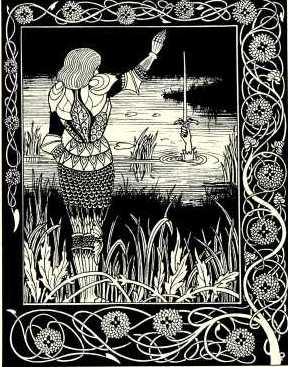

King Arthur & the Matter of
Britain
Sources ·
History & Archaeology ·
Welsh Bards ·
Malory ·
Arthur ·
Gawain ·
Guenevere ·
Percival ·
Merlin ·
Tristan & Iseult ·
Elaine of Astolat
 Le
Morte Darthur by Sir Thomas Malory is the source of the
Arthurian legends as we know them today.
Le
Morte Darthur by Sir Thomas Malory is the source of the
Arthurian legends as we know them today.
Everything that we know with
certainty about the author of Le Morte Darthur is found in his book.
He was called Thomas Malory, he was a knight and a prisoner, and he
finished his work during the ninth year of King Edward IV's reign (4 March
1469 to 3 March 1470). He loved hunting, tournaments, and chivalry, had read
widely in Arthurian romance, and had access to a splendid collection of such
romances while he was writing." -- Peter J. C Field, "Sir Thomas Malory,"
The Arthurian Encyclopedia, Garland Press, 1986
The Morte
Le Morte Darthur is known from two sources: a version printed by
William Caxton in 1485, of which one complete and one partial copy are known,
and a manuscript discovered at Winchester College in 1934 and edited
by Eugène Vinaver in 1947. The former is available
as electronic texts based on the A. W. Pollard 1903 Macmillan version, as
Caxton's edition of Mallory's Le Morte D'Arthur, edited by H. Oscar Sommer (1889),
at the Corpus of Middle English Prose and Verse.
New URL.
Caxton divided the text into twenty-one books, although the manuscript
version makes it clear that Malory originally broke his work into eight
books or "tales". The tales and their primary sources are:
- The first tale, of the birth and crowning of Arthur,
from the French Prose Merlin. (Compare the
Middle English Prose Merlin.)
- The second tale, of the invasion of France and Rome,
from the English Alliterative
Morte Arthure
- The third tale, mostly concerning Lancelot,
from the French prose Lancelot
- The fourth tale, of Gawain's brother Gareth,
based on a lost English poem
- The fifth tale, of Tristram and Isolde,
based on the French Prose Tristan
- The sixth tale, of the coming of the Grail,
based on the French Quest
de Saint Graal
- The seventh tale, of the romance of Lancelot and Guenivere,
based mostly on the French Mort Artu and the
English Stanzaic Le Morte Arthur
- The eighth tale, of the discovery of Lancelot and Guenivere's adultery,
and the battle between Mordred and Arthur,
also from the French Mort Artu and the
English Stanzaic Le Morte Arthur
William Caxton
William Caxton,
best known as the man who edited and published Le Morte Darthur, is
the father of English printing. New !
Essays and Commentary
Evidence
against Lancelot and Guinevere in Malory's Morte Darthur: Treason by
Imagination by E. Kay Harris. "This essay focuses on two important
departures Malory makes from his French source - deviations which constitute internal contradictions in
his text - to show the Morte Darthur's intersection with the legal and political dimensions of the crime of
high treason in fifteenth-century England." It's at
Exemplaria,
A Journal of Theory in Medieval and Renaissance Studies.
Links to other essays on Malory may be found at
the Anthology
of Middle English Literature New URL.
The New Arthurian Encyclopedia (Garland Reference
Library of the Humanities, Vol. 931), edited by
Norris J. Lacy, Geoffrey Ashe, Sandra Ness Ihle, Garland, 1991.
hardcover ISBN: 0824043774; trade paperback ISBN: 0815323034.
A revised and expanded edition of the original 1986 publication, quoted
above.
Top ·
Home ·
Colophon ·
Notes on the Illustrations ·
Site Map
22 February 2004


 Le
Morte Darthur by Sir Thomas Malory is the source of the
Arthurian legends as we know them today.
Le
Morte Darthur by Sir Thomas Malory is the source of the
Arthurian legends as we know them today.